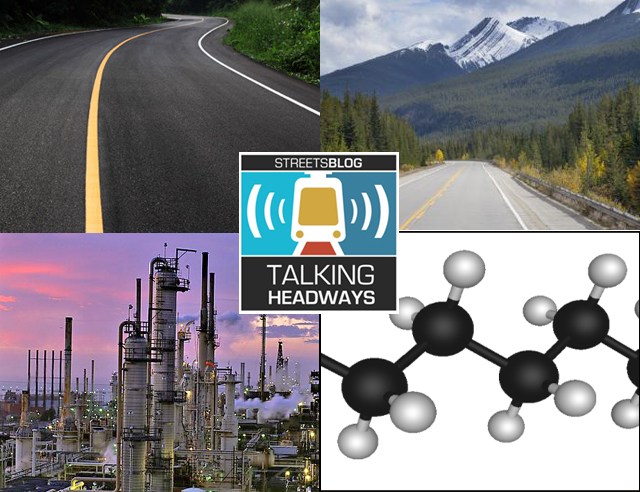This week we’re joined by Kenneth O’Reilly to talk about his book "Asphalt: A History." We chat about what asphalt is, how it was used for building, war, and economic expansion and how it affects the future of the planet. Ninety-four percent of our roads are asphalt, and they are 100 percent recyclable.
For those of you who get your news through your eyes and not your ears, there’s an edited transcript below the audio player. If you want a full, unedited transcript (with some typos!), click here. If you want to listen, here you go:
Jeff Wood: I guess I should ask a basic question: What is Asphalt? What is it exactly because there’s lots of terms for it. There’s bitumen and, and, and then, for the road paving, there’s asphalt, blacktop, tarmac, etc.
Kenneth O’Reilly: Sure. There’s like 200 different synonyms for Asphalt. It’s just incredible. The simplest way I can describe it is to differentiate at two different types — and they’re both natural, by the way. The type we’re most familiar with nowadays is a by-product of oil refining. When a barrel of oil goes into a refinery, the refining process basically separates the oil into different units. Like the really light stuff. The boiling point might be just 100 degrees. For the really heavy stuff, like asphalt, the boiling point is like 1,000 degrees.
A barrel of oil goes into a refinery, and the refinery just separates it into various products. And the way that does that, that’s really complex; it takes a long time to do that. But once you get the valuable stuff, like gasoline, out of the barrel of oil, you’ll have leftover gunk. So a barrel of oil in the refinery processes into different products. Some of the products are worth a lot, like gasoline. Some of the products are not worth very much.
You’ve heard of Koch Brothers. They made their fortune in asphalt and what they call asphalt bottoms. In other words, the gunk, after you’re done refining oil, this thick gunk that’s left over. That thick gunk that’s left over — that’s what paves our roads. We mix that with aggregated, crushed oil, and then lay it out with machinery. We have blacktop highways, blacktop roads, blacktop streets, blacktop playgrounds, blacktop running tracks, and on and on and on. So that’s one asphalt and natural. It’s a by-product of oil refining, but it’s still a natural product ... because you don’t have to add anything. You just remove the lighter hydrocarbons that produce gasoline and what’s left over is asphalt.
Now Asphalt also [exists] just in nature. Essentially what it is, is oil that has lost much of its mass because of weathering, bacteria feeding on it and so forth. So if you just think of like a jar of paint and you mix the paint up, it’s liquid, you can pour it, right? But if you let it sit out, the can sit out in the sun, it’ll start to harden. And eventually it will be thick as peanut butter.
That’s essentially what happens with asphalt. It thickens over time because it degrades because the bacteria have fed off the lighter hydrocarbons, weathering, all that kind of stuff. You have natural asphalt deposits all over planet earth with the big ones in the Western atmosphere up in Alberta, Canada, the tar sands or oil sands, that’s asphalt. In Venezuela, of course, their oil industry, much of it is essentially asphalt as well, but it’s not really considered asphalt because Venezuela is close to the equator; it’s warm. So, in the reservoir, you can kind of pump it out. With asphalt up in Canada, further away, the reservoir is cold. Oil might be thick as a hockey puck. So you can pump it out in order to pump it out. You have to add chemicals. You melt it and then pop it out. But in Venezuela, it’s basically asphalt as well, because once that oil it’s on the surface, it’ll solidify. Because on the surface, the temperature is lower than it is in the reservoir. So you have these two absolutely enormous deposits of natural Asphalt, or very, very, very heavy oil in Canada and Venezuela, both in the Western hemisphere.
Maybe the most surprising thing I found in the book is, when we drive on roads, we might not like it, right, as environmentalists, because it prevents water from getting back into the ground. But at least asphalt pavement is not a carbon bomb. It’s a carbon sink because it’s never going to be burned. We don’t burn roads. Right? We burn gasoline. We don’t burn roads. So that asphalt pavement is hydrocarbon. At least 5 percent of it is, but it’s never going to be burned.
Therefore, it’s a carbon sink, and that’s kind of good. But here’s what really got me: Up in Alberta, when [the oil companies] melt or hack that asphalt out of the ground, they add chemicals to it, or they upgraded to synthetic crude oil and they ship it down here to refineries. They turn it into gasoline. When you’re driving your car, the asphalt under your car wheels, that’s a carbon sink, but the asphalt that’s powering your engine is a carbon bomb.






